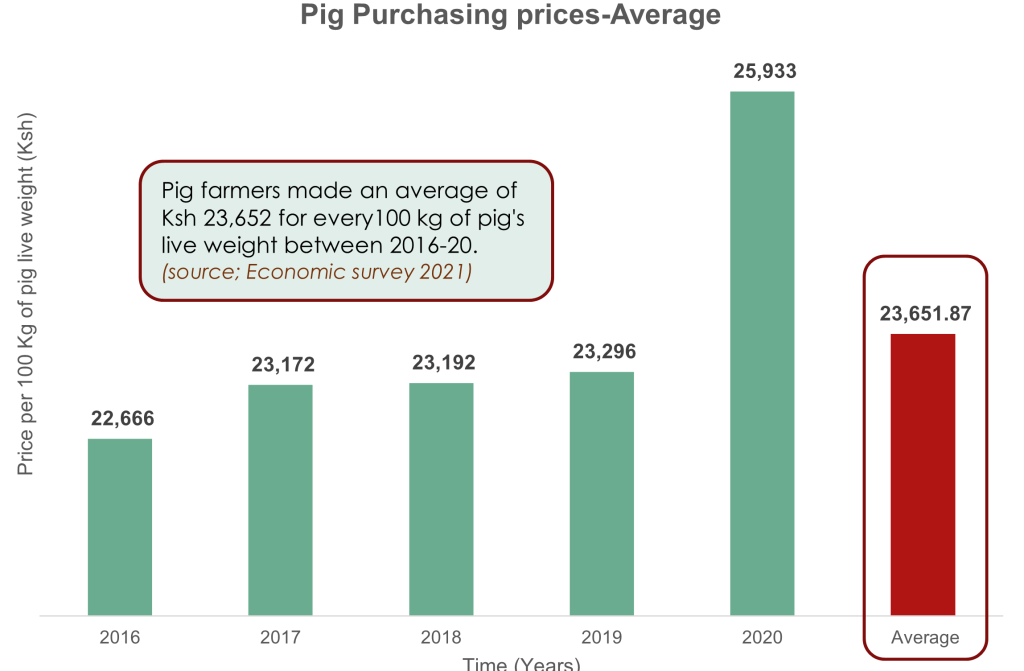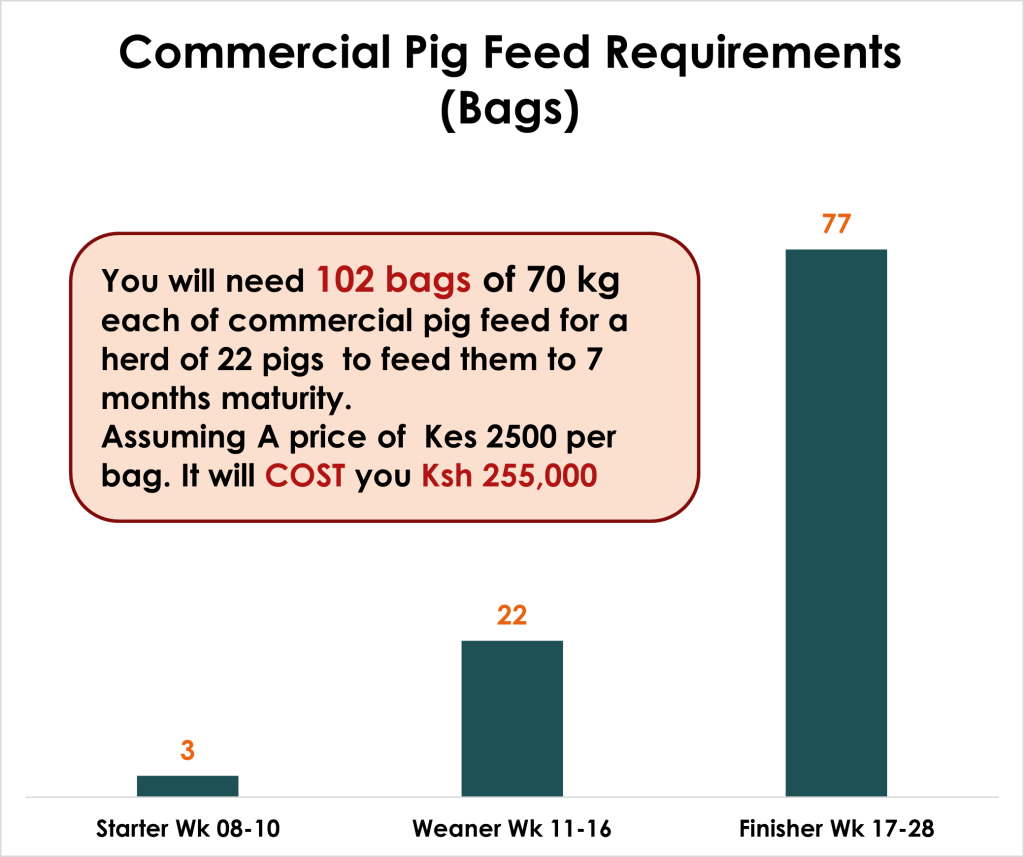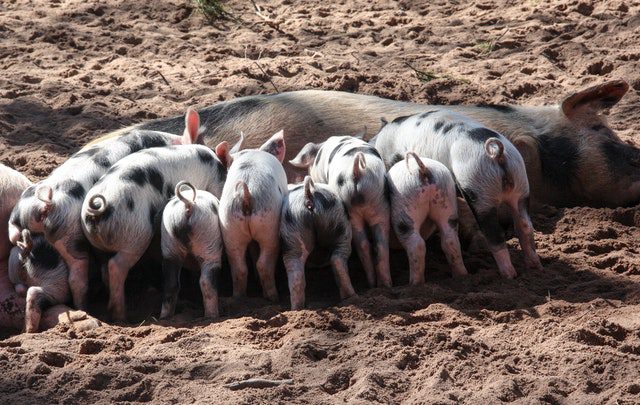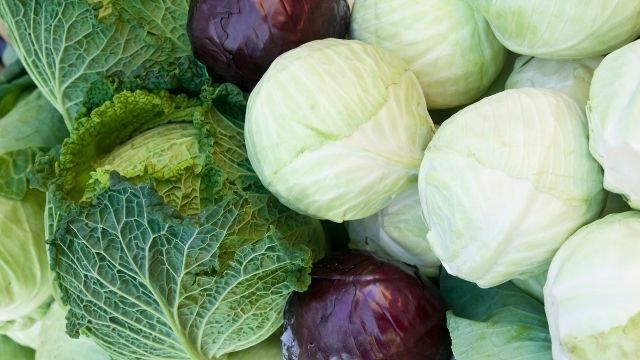Is pig farming profitable in Kenya? Commercial pig farming for bacon and pork is one of the fastest-growing agribusiness value chains in Kenya, Uganda, Tanzania, and Rwanda.
Pork farming can make you a millionaire if done right. The pigs are fast maturing and produce high-quality meat and fat. In this post, we will do a simple cost-benefit analysis (CBA) for pig rearing to determine if it is worth your efforts.
Kenya slaughtered an average of 0.4 million heads of pig each year between 2016 and 2020. The per capita consumption was around 13kg per person each year and it’s expected to double by the year 2030. The aggregate supply in the year 2020 was 27 Metric tons.
Best areas to rear pigs in Kenya
Small intensive pig farming is common in the central (Kiambu, Murang’a, Kirinyaga & Nyeri, Meru), Nairobi, North Rift (Uasin Gishu, Trans Nzoia), Narok and Eastern Kenya (Machakos).
Smallholder-raising systems are common in Busia, Bungoma, and parts of Kisumu. Northeastern and Coast zones have the least pig populations in the country.
Can pig farming make you rich in Kenya?
Why is pig farming profitable? Pig farming can make you a millionaire if done right. The pigs are fast maturing and produce high-quality meat and fat. If you are a beginner in pig farming, you need to estimate the profits for your pig farm. You can do a simple cost and benefit analysis (CBA) or feasibility study to determine if it is worth your efforts.
Your CBA will compare your net profits by getting the difference between the total revenues and the total costs using the formula below.
Net Revenue (NR) = Total Revenue (TR) – Total cost (TC)
where the TC is Total cost = Total variable cost (TVC) + Total fixed cost (TFC)
Other analyses you can consider are the Gross margin and the Benefits-cost ratio determined as follows
Gross Margin (GM) = TR – TVC
Benefit Cost Ratio (BCR) = TR/TC
The sample below is an investment plan for rearing a herd of 22 pigs for 6-9 months. While you can use it for planning purposes, you will need to update it with actual figures once you implement your program.
How much does a pig sell in Kenya?

You can make a Total revenue (TR) of Ksh 573040 from your pig farming in Kenya over a period of 6 months. It translates to you making Ksh 1 million each year if you can manage 2 herds. You will get this money by selling
- 20 fattened mature pigs as porkers or baconers at a price of Ksh 23655 each
- 2 growers (pure breed boars and sows) to other farmers at a price of Ksh 50,000 each
- 102 empty bags at a price of Ksh 30 each
- 35 bags of pig manure at a price of Ksh 70 each
Where to sell pigs in Kenya?
Kenya has 2 market types for pigs. The formal and informal.
In the informal market, farmers sell grower and mature pigs to slaughter slabs, slaughterhouses, or other farmers in their vicinity. Brokers buy live pigs from farms or you can opt to sell yours at a major pork center that operates near the three pig slaughterhouses in the Country. The four major buyers of pigs in Kenya are; Farmer’s Choice Limited, Ndumboni Farm Slaughter House, Lyntano Slaughter House, and the Kabati Slaughter House
| Abattoir | Est. | Location |
|---|---|---|
| Farmers choice | Kahawa West, Kiambu County | |
| Ndumboini | 1972 | Uthiru, Nairobi County |
| Kenol-Kabati | 2007 | Kenol, Murang’a County |
| Lyntano | 1952 | Kiambu Road, Nairobi County |
If you prefer contract farming, consider working with the Farmers Choice Ltd. It is the largest pig abattoir, processor, and exporter in Kenya. You will lock in a price and enjoy extension services and quality products from them.
Other farmers opt to slaughter and sell pig meat to their neighbors.
What is the cost of starting a pig farm in Kenya?
How much do you need to start a pig business in Kenya? You will need Ksh 50,000 to construct a pigsty that can accommodate 30-60 pigs. Such a pig house is constructed to international standards allowing for the highest drainage standards. Each unit will have good drainage, feeding, and watering troughs. If you are looking for hygiene and reduced cost of production, watering nipples should be an option.
Such a modern pig farm will allow you to feed and attend to them from a central corridor. It will have bio-security and disinfection infrastructure such that you reduce infections on the farm.
What are the best pig breeds in Kenya?
Kenya has both exotic and local pig breeds that perform well.
The exotic pig breeds in Kenya are the Large white, Landrace, and the Durocs. They mature fast and grow larger than the local breeds. The three of the most valuable exotic pig breeds in Kenya are summarized in the table below.
| Breed | Maturity Period (months) | Sow Weight (kg) | Boar Weight (kg) | Litter Size |
|---|---|---|---|---|
| Duroc | 6-9 | 250 | 280 | 9 |
| Large white | 6-7 | 280 | 365 | 12 |
| Landrace | 6 | 290 | 355 | 11 |
The local breeds are the many in-breeds which are crossbreeds between the exotic crossbreeds and crossbreeds from the neighboring country of Uganda. The black and white coat-colored pig breed is one of the most popular local breeds of the Landrace and Duroc pig.
Where to buy the best pig breeds in Kenya?
To stock your pig farm, source for breeding stock from Farmers Choice or a commercial contracted pig farmer near you. You will need a pure-bred boar and a pregnant gilt or sow. The cost of a mature boar ranges from Ksh 40,000 while a pregnant sow can go for Ksh 60,000. The cost of the 3 pigs to start your farm will cost you around Ksh 160,000 assuming an average cost of Ksh 50,000 for each.
The gestation period for pigs is 3 months, 3 weeks and 3 days. Your 2 pregnant sows will give birth to at least 22 piglets raising your community herd to 25. It takes between 6 and 9 months for pigs to mature in Kenya. You will now have 22 baconers or porkers to sell.
Besides, you can buy grower pigs or weaners for fattening from your neighbors. They go at around Ksh 5000. A herd of 22 would cost you Ksh 110,000.
Which are the best commercial feeds for your pigs?
To grow high-quality pigs, stick to commercial pig feed only. However, you can supplement your feeding with vegetables and other homemade pig feed made from maize bran and wheat jams to cut your costs.
Related: How to Make Homemade Pig Feed for Best Quality Meat
The table below is the recommended feeding program for pigs in Kenya. As shown, you need 3 types of commercial pig feed; the starter, weaner/grower, and the finisher. You will feed your piglets on the starter feed between weeks 8 and 10. You will then introduce them to the weaner or grower feed when they are between 11 and 16 weeks old. For the last three months, feed your pigs on the finisher feed.
| Pig age (wks) | Body weight (kg) | Feed Ration (kg/pig/day) | Feed Type | Total Feed for 22 Pigs/day (kg) |
|---|---|---|---|---|
| 03-07 | 2-11 | 0.50 | Pre-starter | 11 |
| 08-10 | 12-15 | 0.66 | Starter | 14.52 |
| 10-12 | 15-20 | 1.0 | Sow & weaner | 22 |
| 12-16 | 20-40 | 2.0 | Sow & weaner | 44 |
| 16-18 | 40-50 | 2.5 | Finisher | 55 |
| 18-24 | 50-84 | 3.0 | Finisher | 66 |
| 24-28 | 84-105 | 3.0 | Finisher | 66 |
The cost of commercial pig feed in Kenya.
You will need 102 bags of pig feed each of 70kg to raise 22 pigs to maturity. 3 of them will be starter, 22 weaners feed and 77 will be the finisher type of feed.
The total cost of your pig feed will be Ksh 254,760. This assumes the prevailing price of Ksh 2500 for each bag of feed.

Disease and pest control measures for your pig farm
Domestic and exotic Pigs are prone to many disease outbreaks. The common ones that can easily wipe your herd are the African Swine Flu (ASF), Influenza A, and Porcine Cysticercosis. Others are helminths, coccidia, and diarrhea among others. The Mange, jiggers, and worms are the commonly reported pests by pig farmers in Kenya.
You will need to maintain 1 hygiene, 2 observe biosecurity farm measures and 3 vaccinate your pigs against pests and diseases.
To observe hygiene, rear your pigs in concrete floor houses and wash them daily with chlorine or another disinfectant. Provide your pigs with clean water daily. Have a foot deep on entrances to prevent the transfer of infection from one pig section to another by your workers and provide sanitation units for people to wash their hands.
The farmers choose to have a pig vaccination schedule observed by their contracted farmers. You will vaccinate your animals against Erysipelas, and E.coli. Porcine Parvovirus and Clostiridium. Farmers in the central region deworm their pigs monthly. The summary of this vaccination program and deworming for a farm raising pigs is shown below
Pig Vaccination Schedule in Kenya
A pig vaccination scheme was observed for contract pig farming in Kenya.
- Replacement gilts and boars.
- From the age of 3 months; Vaccination against Erysipilas, revaccinate 3 weeks later.
- From the age of 6 months; vaccination against Porein Parvo, revaccinate 3 weeks later.
- Impig gilts.
- 6 weeks before farrowing. Vaccination against E- coli and Clostridium, revaccinate 3 weeks later.
- Sows and Boars.
- Yearly revaccination against Erysipilas and Parvo.
- Concerning sows, it will be appropriate to do Parvo and Erysipilas- revaccinate in connection to weaning once a year.
- Productive Sows:
- Parity 1:- Vaccination against E-coli and Clostridium about 6 and 3 weeks before farrowing. If any risk for Rhinitis use simultaneous BP.
- Parity 2 and more- Revaccinate every 3 weeks before farrowing.
Where to get the best information on pork farming
Information is power. You can get more profits from your pig farm by seeking and using the latest information on the pork market. You will scout about the best pig breeds, market prices, and how to care for the pigs on your farm to international safety standards.
If you are looking for cheap, credible, and reliable information look for information from following online sources, extension offices, or visiting other farms.
- Online sources by joining a pig farmers forum on Facebook or blogging communities.
- Register for membership in the Kenya National Pig Farmers Association (KENPIFA) lobbying group.
- Watching interviews with successful pig farmers on YouTube (see the one below).
- Published journals and PDFs on pig farming (see resources below) are well-researched and not intended to market a certain company product like pig feeds or vaccines.
- An agriculture county officer or an expert from a large pig farm like the Farmers’ Choice
- Visit other nearby successful pig farms to learn about biosecurity.
Tips for profitable pig farming in Kenya
Are pigs profitable in Kenya? In this post, we guide you on how to start a pig farm and raise high-quality animals. To make money in pork farming, you need to observe the good agriculture practices (GAPs) for raising pigs.
How to be a successful pig farmer? The following 7 tips on pig farming guide can make you a successful pig farmer in Kenya.
- Draw an investment plan
- Hire skilled labor/seek professional advice
- Start with high-quality pig breeds
- Invest in proper housing
- Follow a good nutrition/feeding schedule
- Maintain a vigilant disease & pest management program
- Invest in the latest information on modern pig farming
Farmers Choice buys pigs in Kenya for Sh147 per kilogram for deadweight or cold-dressed carcass weight (CDW). The price is calculated per kilogram and is based on the weight of the pigs.
For example, if your pig’s living weight is 100 kg, here is how much it will be calculated as (100*0.27*147)
Resources on pig farming in Kenya
Farmer’s Choice Pig Management Manual Pdf
FAO Handbook on Pig Production in pdf
Profitability Analysis of Pig Production under Intensive Management




Thank you for this very informative article on pig farming. I am an aspiring pig farmer at the research stage and hoping to start construction and farming in 2023.